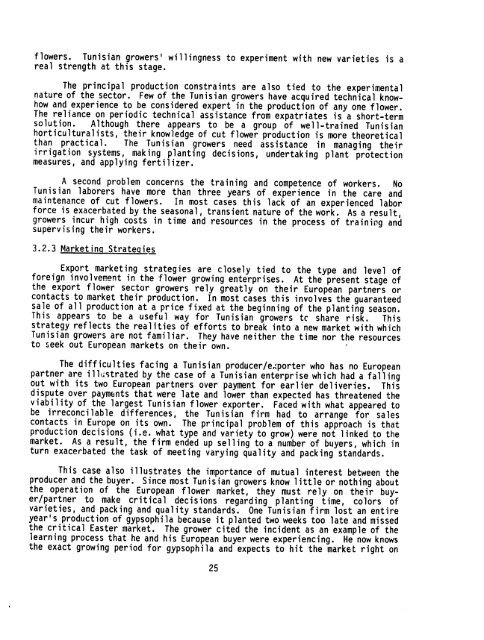APIP Agricultural Policy Implementation Project
APIP Agricultural Policy Implementation Project
APIP Agricultural Policy Implementation Project
You also want an ePaper? Increase the reach of your titles
YUMPU automatically turns print PDFs into web optimized ePapers that Google loves.
flowers. Tunisian growers' willingness to experiment with new varieties isa<br />
real strength at this stage.<br />
The principal production constraints are also tied to the experimental<br />
nature of the sector. Few of the Tunisian growers have acquired technical knowhow<br />
and experience to be considered expert inthe production of any one flower.<br />
The reliance on periodic technical assistance from expatriates isa short-term<br />
solution. Although there appears to be a group of well-trained Tunisian<br />
horticulturalists, their knowledge of cut flower production is more theoretical<br />
than practical. The Tunisian growers need assistance in managing their<br />
irrigation systems, making planting decisions, undertaking plant protection<br />
measures, and applying fertilizer.<br />
A second problem concerns the training and competence of workers. No<br />
Tunisian laborers have more than three years of experience in the care and<br />
maintenance of cut flowers. In most cases this lack of an experienced labor<br />
force isexacerbated by the seasonal, transient nature of the work. As a result,<br />
growers incur high costs in time and resources in the process of trainiog and<br />
supervising their workers.<br />
3.2.3 Marketing Strategies<br />
Export marketing strategies are closely tied to the type and level of<br />
foreign involvement in the flower growing enterprises. At the present stage of<br />
the export flower sector growers rely greatly on their European partners or<br />
contacts to market their production. Inmost cases this involves the guaranteed<br />
sale of all production at a price fixed at the beginning of the planting season.<br />
This appears to be a useful way for Tunisian growers tc share risk. This<br />
strategy reflects the realities of efforts to break into a new market with which<br />
Tunisian growers are not familiar. They have neither the time nor the resources<br />
to seek out European markets on their own.<br />
The difficulties facing a Tunisian producer/e.xporter who has no European<br />
partner are ill,;strated by the case of a Tunisian enterprise which had a falling<br />
out with its two European partners over payment for earlier deliveries. This<br />
dispute over payments that were late and lower than expected has threatened the<br />
viability of the largest Tunisian flower exporter. Faced with what appeared to<br />
be irreconcilable differences, the Tunisian firm had to arrange for sales<br />
contacts in Europe on its own. The principal problem of this approach is that<br />
production decisions (i.e. what type and variety to grow) were not linked to the<br />
market. As a result, the firm ended up selling to a number of buyers, which in<br />
turn exacerbated the task of meeting varying quality and packing standards.<br />
This case also illustrates the importance of mutual interest between the<br />
producer and the buyer. Since most Tunisian growers know little or nothing about<br />
the operation of the European flower market, they must rely on their buyer/partner<br />
to make critical decisions regarding planting time, colors of<br />
varieties, and packing and quality standards. One Tunisian firm lost an entire<br />
year's production of gypsophila because itplanted two weeks too late and missed<br />
the critical Easter market. The grower cited the incident as an example of the<br />
learning process that he and his European buyer were experiencing. He now knows<br />
the exact growing period for gypsophila and expects to hit the market right on<br />
25

















